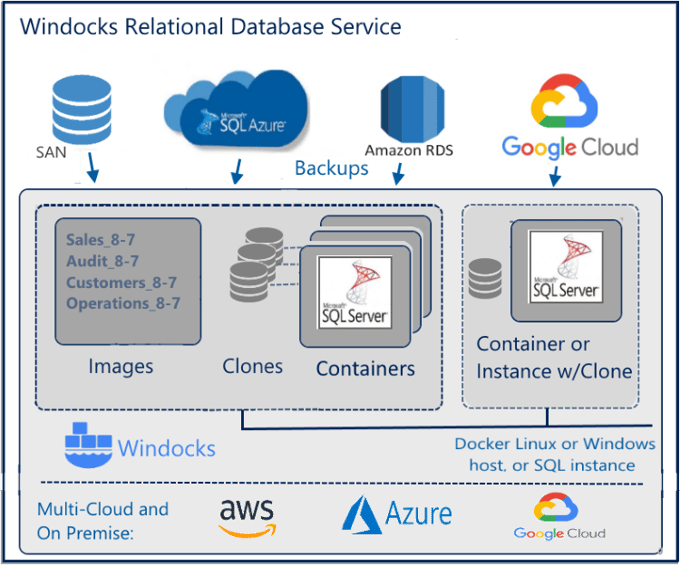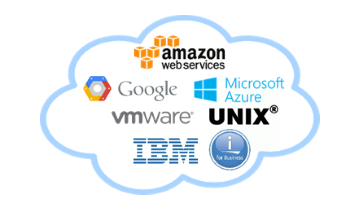Over the past three years Windocks has evolved into a multi-cloud and on premise Relational Database Service (RDS), delivering secure production databases in seconds to any SQL Server environment, providing freedom and modernization of SQL Server data operations:
“Windocks is a multi-cloud and on premise Relational Database Service (RDS) that utilizes any enterprise storage to provide secure data delivery to any SQL Server environment, using any on-premise infrastructure or public cloud.”
Windocks is used by the Fortune 500 and small and mid-sized enterprises, on AWS, Azure, and on premise. Production databases are delivered for development and test, for use with Microsoft’s SQL Server containers, SQL Server instances, and Kubernetes.
Database cloning with "any source"
Enterprise storage is a diverse landscape, composed of storage arrays, hyper-converged systems, secondary storage systems, and Windows and Linux file systems. Windocks data delivery works with any storage system, providing read/write supporting storage volume snapshots or Windows Virtual Hard Drives (VHDs). Both deliver database clones in seconds, while consuming virtually no additional storage. Extensive work with enterprise storage arrays has produced a storage aware design that includes complete life cycle management of the volumes, mount points, and data.
As production arrays are upgraded it’s common for older storage arrays to be redeployed to support dev/test and other uses. Support for diverse storage systems is also useful for orgs that have grown by acquisition. Windocks support for “any source” is ideal for these situations.
Windows VHDs are growing in popularity by providing developers and DBAs the means to modernize data operations independent of storage admins. Full or differential backups are used to build VHD based clonable images, which in turn deliver clones in seconds. This approach is also popular on public clouds. John Hancock uses backups from SQL Azure to build clonable images that serve cloned databases to SQL Server containers, providing support for “DevOps with data” for development and test. Production data is masked and prepared for different groups, and TB class environments are served in seconds, with very low storage usage.

Secure data delivery for any SQL Server environment
While containers represent the future, and are recommended for development and test, containers do not meet all use-cases. SQL Server replication is one example that is not supported by SQL Server containers. This is why Windocks supports database delivery to SQL Server containers (both Windows and Linux), as well as conventional instances, and Kubernetes. In addition to serving the full range of SQL Server targets, Windocks also supports automated provisioning for Continuous Integration testing, as well as user provisioned environments.
Windocks data images are immutable, and incorporate user/group privacy policies, and role based access. SQL Server images support TDE encryption, third party Encryption Key Managers (EKM), data masking, and other data security policies. Images form a data catalog similar to the new Azure data catalog, with metadata for search and reporting. Immutable images combined with metadata provide an auditable record of data use within the enterprise, improving data governance.
Customers realize economy with an average 5:1 reduction in VMs when using containers on a shared VM. Database cloning delivers a 99% savings in storage over duplicated data environments.
Portability with any infrastructure or public cloud
Windocks is a software solution that takes maximum advantage of industry support of Windows Servers to deliver the freedom to run on any on premise infrastructure or public cloud. Windocks images are immutable and ultimately portable, and run wherever Windows Servers are supported.
On premise data delivery has been limited to volumes served from storage arrays and secondary copy appliances. Storage arrays and appliances serve cloned volumes and files, with PowerShell scripts used to create the volumes and mount databases to a target. These solutions are costly to implement and manage, and require dedicated storage admins. A new approach employs Windocks as a front-end to storage systems, providing DBAs and developers the ability to create images and serve up environments without impacting storage operations, and without complex PowerShell scripts.
Cohesity is a leader in hyper converged storage that supports both public cloud and on premise use, and recently reported that over half of their fiscal year deployments involved support for both on premise and cloud use. Forward looking IT decision makers focus on solutions to support both on premise and public clouds, with the freedom to move workloads as needed between clouds. Windocks fulfills this need by providing portable images that can be moved between any public cloud, and that supports both Windows Server 2012 and 2016. Windocks support for any infrastructure is also leading to growing use as a SQL Server service with OpenShift and Pivotal Cloud Foundry.
Aligning data operations with business needs
A Relational Database Service automates use of the storage infrastructure, and provides superior alignment of data operations with business needs. Legacy storage systems struggle to expose data to applications, and lack the metadata needed to align operations with business needs. Windocks operates at the application layer providing developers and DBAs support to automate creation and delivery of secure data environments. Windocks metadata includes users and groups, the origin of the data, and privacy policies applied. For the first time, Managers will have full visibility into the data lifecycle and the steps needed to improve hot fix throughput and effectiveness, and other operations.
RDS = DevOps with data
DevOps strategies are ubiquitous and most advanced for support of .NET and Java for front-ends, and middle-tier applications. Organizations continue to struggle, however, to incorporate relational back-ends into Continuous Integration processes. Industry surveys indicate the average database back-end test environment is updated twice monthly or less, and few organizations achieve adequate test coverage with VM or shared SQL Server instances.
It’s time to modernize SQL Server dev/test support with production database clones, to enable “full stack” development and test, for improved test coverage and quality. Clones provide full read/write support, are provisioned in seconds without impacting storage, and provide the best environment for functional and unit testing. While we recommend Docker containers for dev/test, organizations also need data delivery for all SQL Server environments. Windocks provides this with support for Microsoft Docker SQL Server containers, instances, and Kubernetes.
A hallmark of a modern Relational Database Service is simplicity, and you can explore Windocks RDS with a free Windocks Community Edition. Windocks installs on Windows 8.1 or 10, Pro or Enterprise editions, Windows Server 2012 R2 or 2016, and you can deliver clones within an hour of starting.
